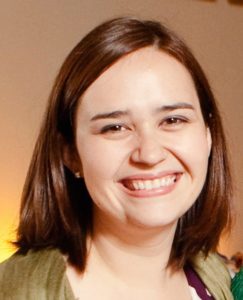Elena Serna-Wallender grew up in Texas and attended San Antonio Mennonite Church throughout college, and for several years after. She worked for an environmental coalition and for Big Brothers Big Sisters in San Antonio before moving to New Jersey for grad school. Elena earned a master’s degree in Public Affairs from the Woodrow Wilson School at Princeton University, and she is now a research analyst at MDRC, a nonprofit research firm whose mission is “to create and widely disseminate rigorous, nonpartisan, credible evidence on the effectiveness of policies and programs aimed at improving the lives of low-income families, children and communities.” She and her husband still live in Princeton – but hope to return to Texas someday!
I grew up in a large, non-denominational evangelical church in Dallas. I have very fond memories of that church community, and it laid a foundation of faith in which I am still rooted. As you might expect from an evangelical church community, we focused a lot on salvation, and everyone in my life fell into two broad buckets – Believer and non-Believer, saved and not saved. I spent many hours of my youth anxiously writing out lists of friends and family members, praying earnestly for the ones in the non-Believer column, feeling guilty for my failure to save them.
When I started college, I got involved in a like-minded evangelical student fellowship group, and my faith life centered around personal spiritual growth – reading the Bible, engaging in group and individual prayer, serving in leadership within our fellowship group… I still sorted anyone that I met into those two buckets – saved and not saved – and I pretty much stuck with the first group.
I stumbled upon an introductory Urban Studies class during my freshman year, where we learned about poverty in the U.S., and about some of the ways that our society has put systems and policies in place that keep people mired in generational poverty. This class pushed me into the city and ignited an emotional and intellectual spark that has burned ever since.
Naturally, what I was studying in class and exploring off campus started to seep into my faith life. What did God think about poverty? Did Jesus ever say anything about racism? In my volunteer work, is it okay if I focus on meeting someone’s physical or emotional needs (hunger, housing, employment, friendship) instead of or before their spiritual needs? These are things that my faith experiences and communities hadn’t prepared me for – that they weren’t well equipped to respond to.
Thankfully, I found San Antonio Mennonite Church in the midst of this shift in my faith. We sang God of the Bible during the first Sunday that I visited – I remember because I was so shocked and pleased to find a church community singing about being “midwives of justice, birthing new systems, lighting new lights.” I never looked back.
The Mennonite Church taught me about service, about faith in action. Folks at SAMC humbly and earnestly engaged in the world around them, doing their best to respond to God’s call to seek justice, make peace, and show love. I found mentors who modeled a fusion of faith and service that I hadn’t encountered before, and that I try to emulate now.
I work for a nonprofit research firm that is committed to using its work to improve the opportunities of low-income people and communities. This means that I am able to work within the intersection of faith and profession like the mentors from SAMC modeled so well. Our research is designed to help policymakers and practitioners identify programs and policies that truly make a difference – and our findings sometimes bring about broad, transformative change for the communities that we serve. In my own little way, I really do strive to be a “midwife of justice, birthing new systems.”
Studies and career have moved me away from San Antonio and I have (at least temporarily) settled in Princeton, New Jersey – an hour away from the closest Mennonite congregation. I miss being immersed in the Mennonite world – and I hope to return to it in another season – but thanks in large part to those incredibly formative years at SAMC, I remain rooted in a faith centered in service and love without conditions.



